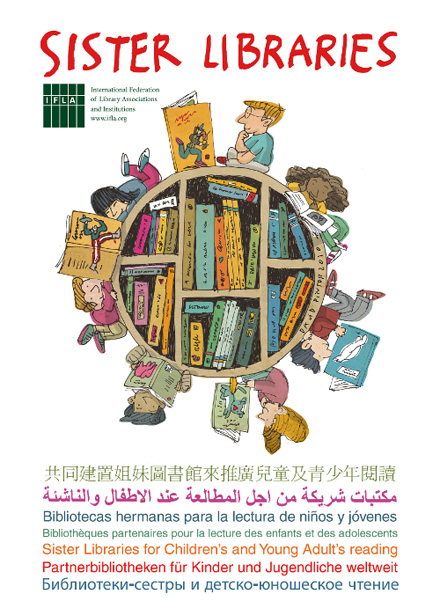Sister Libraries for Children’s and Young Adult’s Reading

It is a programme of IFLA Section Libraries for Children and Young Adults for children’s libraries to build a partnership, exchange views and experiences, collaborate and develop joint programmes for children’s and YA’s reading.
“Sister Libraries” – the concept has been seen to be very beneficial and rewarding for many libraries. The exchange of knowledge, information, resources, experience and good ideas on library work for children and YA with colleagues abroad opens one up to new possibilities and can even help overcome difficulties faced. It also aims to circumvent professional isolation and stagnation, and provides a channel for professional stimulation, motivation and dialogue. The value of the programme is further enhanced with endorsement from an international body (IFLA) and the cross-border collaborations. With this, libraries can better opportunities for support from authorities and also divert their attention to the importance of children and YA reading.
Participants can be public libraries, school libraries or organizations working with libraries. Communication is via email/internet (at the library or privately). Partners need not be IFLA members. The twinning is embedded in the institutions – it is not just something the librarian does on a personal basis. An individual librarian at each library must be identified as the key contact, to ensure continuity and sustainability of the relationship.
Many activities can be carried out without any expenses (other than access to internet costs). Other activities may need funding – this will be for the parties involved to source. The major investment is staff time and enthusiasm!
How to find a sister library?
- Register: fill and in send the online Registration Form.
- Find libraries that interest you in the List of participating libraries and make connections with them via email
- Once the partnership is decided, inform Information Coordinator (The List of participating libraries will then indicate that the libraries have been “paired”)
Note: The agreement between libraries can be informal, or formalised in written form.
What can sister libraries do?
Possibilities of things to do are endless… Libraries choose what to do, according to the degree of involvement they want (it may just be communication/dialogue via email once a month!); also, according to what they can offer and according to what they need and the benefits they are seeking.
The first thing is getting to know each other: by email, skype, sms, by writing and through pictures of the library and of the staff…
Then, paired libraries can collaborate in three main directions:
- create joint content/projects/activities, digital as well;
- staff exchange and visits;
- object exchange (books/exhibitions).
More examples for partnership – Librarians can:
- share ideas on library programs for children and YA
- share information about practical issues related to children’s and YA’s reading: classification, room design, technical issues…
- share difficulties related to children’s and YA reading, and try to think and find solutions together
- exchange information on good books; set up a children and YA books reading committee and exchange book reviews
- help each other select and buy good books
- share the good moments: exchange photos of activities and events
- exchange professional training
- exchange of staff for a short period
Librarians, with readers, can develop joint programmes:
- exchange photos and information on the library and the users, to display on a board (or virtual visits, if possible)
- reading clubs where the same books are read (could be books about/from the other country)
- youth expression programs
- programmes for the promotion of boys’ reading
- programmes for babies and toddlers
- select and display books and information about the sister library country
- write texts, illustrate them and publish them jointly
Support from IFLA Section
There is a Sister Libraries mailing list dedicated for just the communication for participants.
If you have questions, contact the project coordinator Anton Purnik.
Share your experiences!
After establishing a partnership, you are strongly encouraged to share yout experiences, ideas, activities, best practices and challenges concerning your partnership, with other Sister Libraries but also with the whole library community. There are several ways to do this: